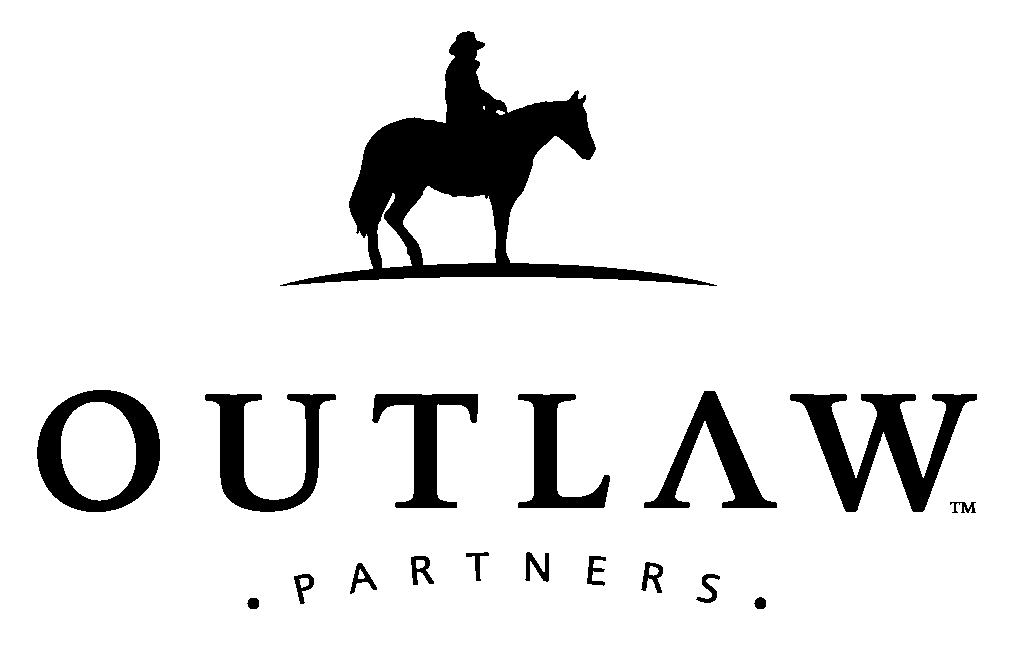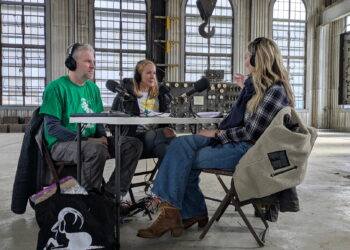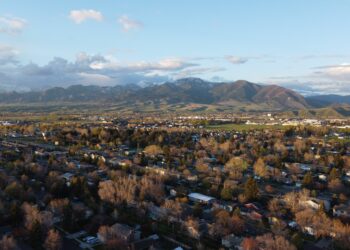NPR correspondent to moderate panel on trust and the media
By Bella Butler Managing Editor

BIG SKY/NEW YORK – A free press, a privilege that in the U.S. has also been ratified as a right, is intended to work in direct relationship with the public. A conduit of connection, media at its best is a service.
More recently, media is party to a perceived war between the press and the people, forged of what the American Press Institute called a “trust crisis” in a 2021 study.
It’s a conundrum that Explore Big Sky Editor-in-Chief Joseph T. O’Connor has discussed at length with TEDxBigSky speaker and former CNN editor Jan Winburn. Inspired by these conversations, Outlaw Partners, publisher of EBS, will host a panel discussion on trust and the media on Jan. 27 as part of the Big Sky Ideas Fest.
Moderated by longtime reporter and NPR Media Correspondent David Folkenflik, the panel will feature journalists from across the state of Montana including John Adams, founder and executive director of Montana Free Press; Luella Brien, publisher of Four Points Press; Todd Wilkinson, founder of Mountain Journal; and Outlaw’s O’Connor.
“Inviting this array of panelists to the conversation and inviting our respective audiences to ask questions of us will hopefully shine some light onto the main objectives we’re trying to achieve with our work: truth, transparency and trust,” O’Connor said.
While trust in the media is no new issue, Folkenflik and O’Connor argue that recent events have exacerbated a decades-long tension, making this panel timely and important.
“I do this job because of this community,” O’Connor said. “And I want to hear questions from the community to hopefully continue building trust together.”
The Jan. 27 panel discussion starts at 5:30 p.m. at The Independent theater in Big Sky. The event is free and open to the public. Click here for more information.
In anticipation of the panel, EBS interviewed Folkenflik to glean background on trust in the media from a seasoned journalist. The following Q&A has been edited for clarity and brevity.
Explore Big Sky: Earlier in our conversation, you said “there’s so much heat right now” around trust and journalism. You’ve been in this business for a few decades. Is that a new experience and a new observation? Is that a shift from where media has been in relation to audience?
David Folkenflik: There’s been a five-decades-long sort of attack on the … credibility of the press from senior levels or top levels of the Republican Party of the conservative movement to varying degrees of intensity.
Then you get to … the 2000 election and I think this is a real turning point because you have essentially in Florida what amounts to a jump ball … And the left really got angry at the press for essentially not preventing a conservative majority of the Supreme Court from validating George W. Bush’s election win and I don’t know what they expected the press to do, but there was an anger there.
And social media kind of comes online a few years later, where it’s clear that Iraq is a complete debacle and that Afghanistan is not going great and the financial crisis has happened. You’ve got these sort of populist movements unleashed like the Tea Party and Occupy Wall Street. And then you have a president who comes on board and just trashes the media as a central part of his appeal and platform. Social media has become a place where people really attack, misrepresent and troll and do all kinds of other things as well as share insights from around the world, around the nation, around the community; share original material, share testimonies, share video, help improve things, one or the other. I think Twitter is both a cesspool and invaluable…
The way we’ve typically thought about [trust in the media] is it has to be earned daily, and sometimes hourly. Even as time moves forward, as my former colleague and friend, Jan Winburn, recently said in a conversation with me, ‘trust travels backwards, because it’s built on what came before.’ And so it’s complicated because people remember aggrievements. They may remember lightly, they may remember it wrongly, it doesn’t ultimately always matter because you can’t convince somebody that they’re wrong very easily. You have to demonstrate your good will, and good will is something that is not assumed so often anymore …
This is really complicated. There are ways to do what you can on the question of trust. But trust is a central place for news organizations, and different folks have different ways of approaching it.
What we’re doing is trying to give you the information that you need to be a citizen instead of just a consumer so that you have the information you need to make choices … And if we don’t have credibility, people don’t trust us. Then … people will either ignore what we provide or they will discount it.
– DAVID FOLKENFLIK
EBS: I guess one way is just having a conversation about it and offering journalists who are maybe fighting that uphill battle to invite the audience into that day-to-day work and that day-to-day attempt to earn trust. So why are conversations about trust in the media important? Why is trust in the media itself important?
DF: Journalists [are] not providing something that you could wear. We’re not giving you something that will on its own make you rich. What we’re doing is trying to give you the information that you need to be a citizen instead of just a consumer so that you have the information you need to make choices about the world around you; how to think about issues at school board or in Congress or a dispute over development somewhere or how to feel about somebody [who] wants to change the name of a college mascot … And if we don’t have credibility, people don’t trust us. Then … people will either ignore what we provide or they will discount it.
Credibility is the currency that we’re on here. It’s what you have to offer in a lifetime of journalism … We’ve got to be able to show what we know, how we know it.
Conversations like this help to lift the veil a bit and to say, ‘Hey, you got questions? Let’s give some answers.’ Let’s explain how we came to certain choices. Let’s explain the kinds of dilemmas that we confront. Let’s think about how we walk through, how we cover the stories we cover, and even sometimes how we pick the stories we cover. Because editorial choices mean that journalism is not a science …There’s an art to it. It involves a lot of judgment and choices, and those choices are inherently subjective, which doesn’t mean that you don’t care about indisputable fact and it doesn’t mean that you don’t care about fairness. It doesn’t mean that you’re not trying to reach people of all different ways of thinking about things. But it means that these are choices and you’ve got to be able to defend those choices.
EBS: I think about this essay written by Clay Shirky, and he argues that a healthy level of skepticism among the public helps advance journalists toward a more inclusive and real truth. And we have all of these additional fact checkers now through platforms like social media. And so it’s sort of a question of balance at that point for news consumers: How much do you trust and how much do you employ that skepticism? In a perfect world, what does that ideal relationship between a news source and the public and news consumers look like? How does that operate?
DF: One of the things about journalism is to remember that journalists rarely are people who know the most about the subject themselves. They may have expertise in the subject, but what they’re doing is drawing upon the intellectual capital and the knowledge of others and other sources of resources, documents they can draw from to create the best possible fact-based version of events or of issues or of matters under scrutiny. And yet, you can see on social media, people respond in real time: government officials, scientists, lawyers, activists or ordinary people whose lives have been affected…who are providing real-life testimony. An anecdote or an incident doesn’t prove or disprove anything, but it can give texture to what’s going on and force people to accommodate or reconcile the version that they’re presenting to the public with certain kinds of facts on the ground.
I think you saw a lot more coverage and a lot more thoughtful skepticism … about, for example, police behavior. Once people were uploading videos, you saw things that happened to [Walter Scott], a gentleman who was shot in the back fleeing police in North Charleston. And police had an open warrant on him for failure to pay a certain amount of child support. … Police had represented that story as happening very differently, but somebody took video of that guy running through a field basically away from a park, away from cops. It just forced a very different discussion of what was happening. You saw that in Minneapolis, you saw that in all kinds of other places.
I think that is really worth acknowledging: that people providing information like that are forcing a reckoning and also forcing Americans to confront a different kind of truth than they might otherwise have been willing to do. To me, social media has been incredibly important. It is a resource relied upon … I think it is enriching our understanding of the world around us, but it’s also drowned us in a lot of heat and negativity and rhetoric and the combination is complicated.
I think it can be revelatory to see behind the scenes, and to hear these are people doing this not to get rich, but to make sure that Montanans and others understand their world.
– DAVID FOLKENFLIK
EBS: What do you hope that this panel in this discussion accomplishes and what do you hope your role does in terms of that goal?
DF: I’m just hoping to make sure people have both a good time and an evening that provides some insight into how things work. So people can have maybe some of their questions answered … but also see that there’s a real sense of kinds of care and insight that is brought to bear on making decisions. Even if you don’t always like the decisions made you can respect the thoughtfulness and the intentions that went into that.
I think it can be revelatory to see behind the scenes, and to hear these are people doing this not to get rich, but to make sure that Montanans and others understand their world. And it can be a fun, wonderful endeavor, but there is a public service element to it. They’re not doing this because they dislike the public. They’re doing this because they think the public deserves to understand their world and it can be rewarding and fulfilling to find stories to tell that do that and that round out, in perfect world, our understanding of one another’s people. And even journalism done at its best often raises uncomfortable issues, but also collapses the distances between different people in different parts of the state or in the community.











